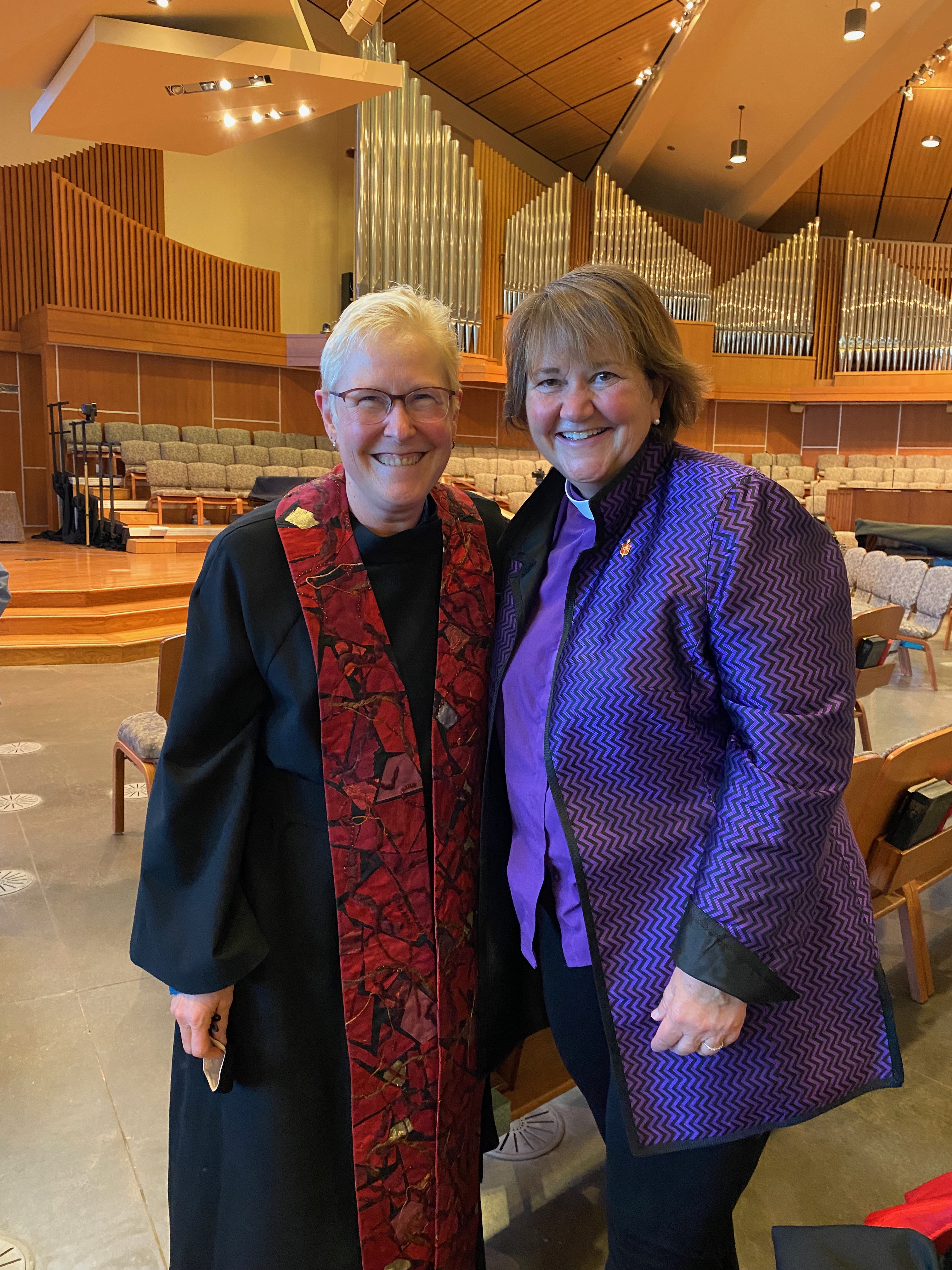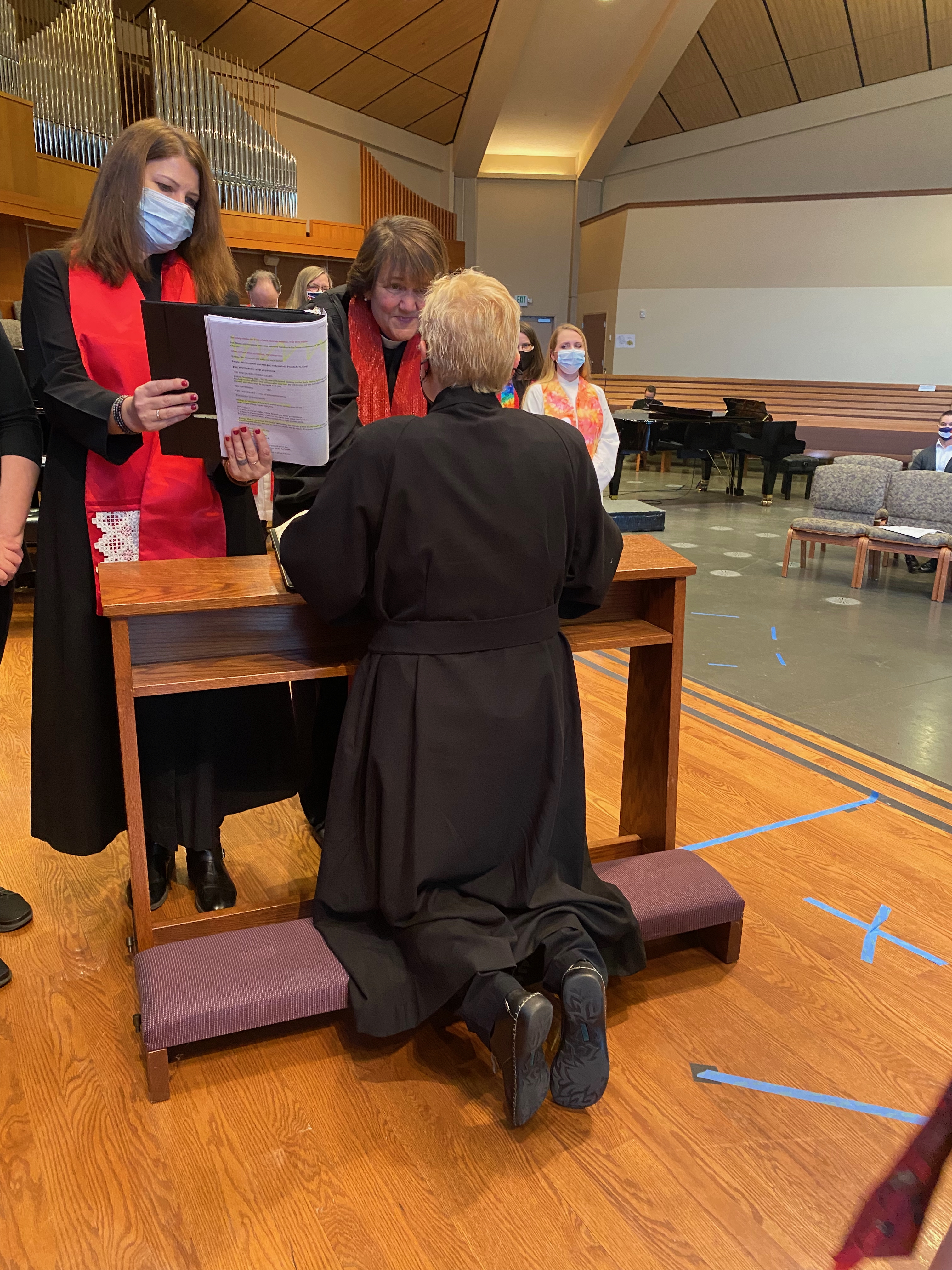Beth A. Richardson (Elizabeth Ann) was born April 4, 1957 in Norman, Oklahoma, to parents, Margaret Wilson Richardson and Charles Richardson.
Charles and Marty had met in Norman in the mid-1950s, when Beth’s dad was in his first appointment at a Goodrich Memorial Methodist Church. Fresh out of seminary and new to the city, Charles asked Finis Crutchfield, the pastor at McFarlin Methodist Church: “Where is the best place to meet young women?” Finis told him to go to the Wesley Foundation at Oklahoma University, and that is where Charles met Marty Wilson. Finis performed their marriage and baptized Beth and both of her siblings. When a group of Colorado vacation cabins came up for sale in 1957, Finis gathered a group of Methodist pastors from Oklahoma and New Mexico and purchased the lot. Beth grew up going to the cabin in the summertime and being formed by that community of clergy families, including the Crutchfields. (In the years after Finis’ retirement, she interacted with him at General Conference as she was there working with Affirmation and Reconciling Ministries. She remembers Finis treating her and Morris Floyd to lunch in a restaurant filled with other bishops.)
Richardson spent her childhood in little towns in Oklahoma. She loved being a preacher’s kid and could not imagine being in a family that wasn’t intimately a part of the church. As a child, she imagined herself marrying a preacher. When she was in late grade school, her dad introduced her to Mrs. Margaret Marcy, a local pastor in the little town of Mangum, Oklahoma. That was the first time she realized that women could be pastors.
She was formed for church leadership through participation in the Oklahoma Conference youth programs. One summer at a conference youth gathering at Canyon Camp, she was handed instructions and informed that she would be leading the next group. This care for the development of young people led to her and many of her high school friends going into full-time ministry.
Richardson attended college at Oklahoma City University (BA, 1979). She majored in sociology and was a part of the leadership of campus ministries. She also participated in music performance and was a part of a women’s trio called “Harmony” that traveled around the state raising money and awareness of OCU.
She was introduced to the Appalachia Service Project during the summer of 1976 when she was on the summer staff of Boston Avenue UMC in Tulsa, Oklahoma. During following summers, Richardson served on the summer staff of ASP. This experienced broadened her world as she witnessed people living in poverty for the first time.
During college, she had begun the process of coming out as a lesbian. Curious about these feelings she had, she went to the university library. The only book that was available was Tearoom Trade: Impersonal Sex in Public Places by Laud Humphreys, 1970. She was so hungry for knowledge that checked the book out and read it. (This book is now widely known for its author’s unethical methodology.)
She found the lesbian community in local bars and then discovered, to her surprise, that there were gays and lesbians everywhere, even among her friends at the university. She assumed that her career in the church was over. That the church would not want her since she was gay.
After graduation from college, Richardson moved to Nashville, Tennessee to work on the full-time staff of Appalachia Service Project. She began to attend Edgehill United Methodist Church, a church which had been welcoming to queer people for many years. Edgehill’s church-wide study of homosexuality became the model for UM churches discerning whether to join the Reconciling program.
In the fall of 1979, Richardson received a letter from Affirmation: United Methodists for Gay and Lesbian Concerns. A year earlier she had sent a query to a post office box in Dallas, Texas after seeing a personal ad about Affirmation in the back of a Ms. Magazine. It said, “Gay? Methodist? Write Affirmation.” The letter introduced her to Affirmation and invited her to attend a gathering in Indianapolis in the fall of 1979.
She attended the Fall 1979 meeting of Affirmation in Indianapolis, Indiana and was delighted to learn that there were other United Methodists like her. She returned to Indianapolis in the spring of 1980 to attend the General Conference. After that, she attended most of the twice-yearly Affirmation meetings and joined Affirmation’s witness at General Conferences.
Richardson entered the M.Div. Program at Vanderbilt Divinity school in the fall of 1981. She knew that the church would not employ her, but she still felt a strong call to follow this path. She was able to be totally out as a lesbian during this period of her life. She received her M.Div. from Vanderbilt in 1984.
In 1983, as Affirmation was forming the organization that would become the Reconciling Ministries Network, Richardson became one of the two coordinators for the program. Along with Mark Bowman, she helped shape the early years of the Reconciling Congregation Program.
While she was working on her degree, she interned for a summer at Alive Now magazine at The Upper Room. That summer, she fell in love with editing and wanted more than anything to serve on the staff. She joined the staff of Alive Now in 1986.
For a couple years, she served both on the staff of The Upper Room and also as co-coordinator of the RCP. She became afraid that her work with the Reconciling program would cause her to lose her job for the church. So in 1987, she “retired” from the co-coordinator position. She continued to work at The Upper Room, self-censoring herself and her writings to protect her job.
She began to follow her calling despite the church’s barriers. She began the process of becoming a Diaconal Minister. (At that time, there was not language in the Book of Discipline against g/l persons being consecrated as diaconal ministers.) At her final interview, the chairperson of the board met with her and let her know that one of her seminary friends had outed her to the committee. She let Richardson know that they had approved her for ministry. But asked her “not to embarrass them.” She was consecrated as a Diaconal minister in 1988. In 1997, she was ordained a a permanent Deacon.
Being a member of the Tennessee Annual Conference was a great source of stress. For years, Richardson feared that one of her seminary mates would bring charges against her and she would lose her ministry. In 2010, Richardson applied and was able to move her conference membership to Rocky Mountain Annual Conference, a much more affirming community.
Through her ministry at The Upper Room, she began to be able to live out her liturgical calling, leading worship at The Academy for Spiritual Formation and The Upper Room’s SoulFeast conferences. Late in her ministry, she applied to change her ordination from Deacon to Elder and she was ordained an Elder in 2021 by Bishop Karen Oliveto.
 Beth with Bishop Oliveto
Beth with Bishop Oliveto
She retired from The Upper Room in May of 2022 after 36 years of service. Beth's ordination
Beth's ordination
(This biographical statement was written by Beth Richardson.)
Biography Date: July 2025
This "Reconciling Congregation Discernment Event" paper was written in 1983 for Richardson's senior project in seminary and was developed into some of the early resources of the Reconciling Congregation Program. Click here for the first half of the paper. Click here for the second half of the paper.
“Beth A. Richardson | Profile”, LGBTQ Religious Archives Network, accessed March 05, 2026, https://lgbtqreligiousarchives.org/profiles/beth-a-richardson.